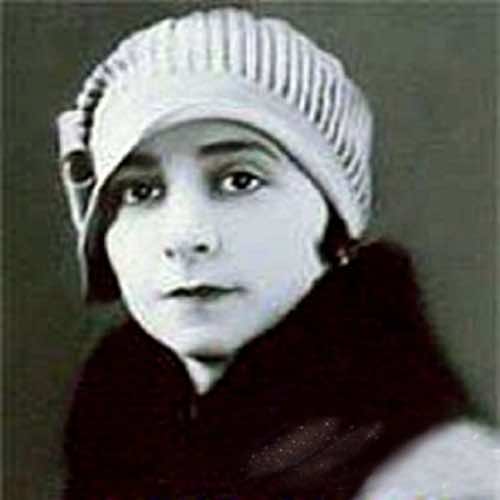Banin, the first French-speaking Azerbaijani writer
 Asadullayeva Ummulbanu Mirza gizi (Banin) was an Azerbaijani writer who lived and worked in France. Umulbanu, the granddaughter of famous Azerbaijani millionaires Shamsi Asadullayev and Musa Nagiyev and the daughter of millionaire Mirza Asadullayev, one of the ministers of the Azerbaijan Democratic Republic, was born on January 16, 1905.
Asadullayeva Ummulbanu Mirza gizi (Banin) was an Azerbaijani writer who lived and worked in France. Umulbanu, the granddaughter of famous Azerbaijani millionaires Shamsi Asadullayev and Musa Nagiyev and the daughter of millionaire Mirza Asadullayev, one of the ministers of the Azerbaijan Democratic Republic, was born on January 16, 1905.
Banine’s mother died in childbirth, she and her three sisters Kovsar, Suriya and Kubra were raised by a foreign nanny. The October Revolution and the establishment of Soviet power forced them to leave their homeland, so they emigrated first to Turkey, and from there to Paris in 1924.
In Paris, Banin worked as a fashion model, a sales clerk, a secretary in an office, and a translator. Gradually, Banin joined the literary society of Paris and gained fame among Russian émigré writers. Here she makes acquaintance with the philosophers Berdyaev, Shestov, Lossky, poets and writers V. Ivanov, M. Tsvetaeva, K. Balmont, I. Severyanin, Ivan Bunin, Taffy, Remizov, Merezhkovsky and his wife Z. Gippius, Kuprin, Zaitsev, Adamovich. Following the advice of her French friends, Banin began to write her own memoirs. Bani's debut novel, “Nami”, was about the collapse of social structure in Azerbaijan in the pre-revolutionary era and the socio-political turmoil that affected all segments of society, but it was barely noticed. However, Banin did not become disheartened and in 1945 she published the novel "Caucasian Days", which made her name known to the French reader. The novel reflects her childhood memories. After the book's publication, Banine attracted the attention of Western writers such as André Malraux, Ivan Bunin, Nikos Kazantzakis, Henry de Montherlant, and Ernst Jünger. Bani's friendship with World War II veteran, German writer and philosopher Ernst Jünger, lasted for more than half a century. Banine even dedicated books to him. After this work, the author wrote “Parisian Days”, “Meetings with Ernst Jünger”, “After”, “The Call of the Last Chance”, “Foreign France”, “Portrait of Ernst Jünger”, “I Chose Opium” and other novels gained her a wide readership. Banine's last literary work, the novel "What Mary told me"-was published a year before her death in 1991.
Banin was known in France not only as an author of interesting novels, but also as a skilled translator. She translated Dostoevsky’s “Another Man's Wife and a Husband Under the Bed” and “Memoirs” of Tatyana Tolstaya from Russian, Ernst Junger's novel “The Peace” from German, Gregory Marton's “The Boy and His Friend the Blizzard” and V.T. Vand's “What Saint-Paul Really Said” from English into French.
During the difficult times for the Azerbaijani people, Banin published an article in the French newspaper Le Monde (January 20, 1990) entitled "Nagorno-Karabakh". In that article Banine wrote about Karabakh, the Armenians who were resettled by the tsarist government as a result of the war with Persia and Turkey in the Azerbaijani lands in the early 19th century. She spoke about the Armenians’ old claims to the Azerbaijani lands, the Dashnaks’ ties with the Bolsheviks and their joint actions against the Azerbaijani people.
She passed away, on October 29, 1992. The Parisian newspaper "Le Figaro" reported the writer's death on the same day under the headline, "The first French-speaking Azerbaijani writer Banine has died".
Recommended literature:
- Banin. Qafqaz günləri / Banin ; frans. tərc. H. Qoca ; Qafqazın Strateji Tədqiqatlar İnstitutu. - Bakı : Qafqaz NE, 2006. - 240 s.
- Mahmudov, Calal Müseyib oğlu. Bakı nefti, neft milyonçuları və Nobel qardaşları: elmi-publisistik monoqrafiya /C. M. Mahmudov; elmi red. Z. S. Abdullayev. - Bakı: Nurlan, 2006. - 335 s.
- Банин. (Асадуллаева Умм эль-Бану Мирза кызы ). Кавказcкие дни: автобиография (в полная версия) /Банин ; пер. с франц. С. Бузулукина ; ред. Б. Закирова ; оформ. обл. Р. Гасым. - Баку: Ганун, 2020. - 400 с.